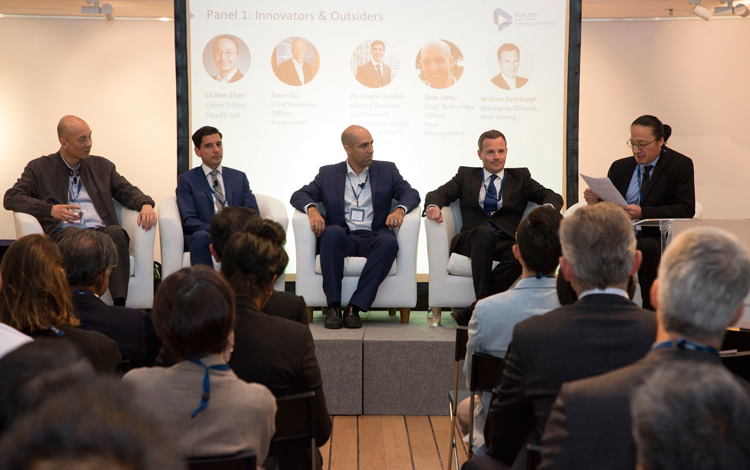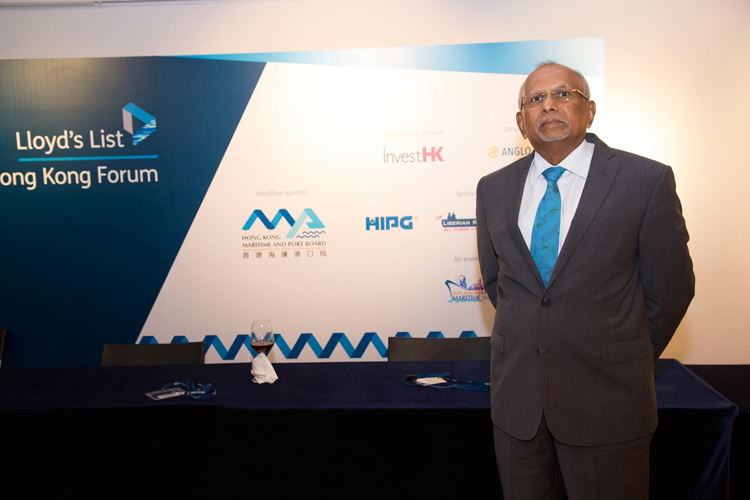December, 3, 2019

The Hambantota International Port Group (HIPG) participated in the prestigious Hong Kong Maritime week, which was held from 17th to the 23rd of November. An important event in the world maritime calendar, this year too it brought together key industry players from across the globe to showcase their expertise and network at the number of events that were organised through the week. Lloyds of London, a big name in the industry played a significant role in the annual event by organising the ‘Maritime Business Forum’ held at the Hong Kong Maritime Museum on 20th November.
HIPG was a key sponsor of the Business Forum which this year focused on the topic ‘Technology reaches beyond regulatory compliance.’ Two high powered panel discussions were held, chaired and moderated by Lloyd’s List China Editor Cichen Shen and Lloyd’s List Asia News Editor Vincent Wee. The two panels consisted of industry specialists who were able to provide first-hand insight and knowledge on the topic. Luis Benito, Director of Innovation and Co-creation, Marine and Offshore, Lloyd’s Register; Arthur Bowring, former MD of HKOSA; Bjorn Hojgaard, CEO, Anglo-Eastern Univan Group; Shah Irani, CTO, Fleet Management; Joseph Law, Senior Director, LNG bunkering; Christophe Letelier, Head of Business Development, International Supply Chain, Asia Pacific, Kuehne+Nagel; Lionel Louie, Chief Commercial Officer, CargoSmart; Guy Platten, Secretary General, International Chamber of Shipping (ICS) were some of the speakers who shared knowledge.
The two panels debated several viewpoints concluding that while the shipping industry will inevitably see a digital transformation taking place, it may well take some companies by surprise, while others might be forced to comply. One of the panelists had expressed the view that when disruption takes place in any industry, it is usually the incumbents that are the last to see it coming. He opined that the commercial side of the industry will see a huge change, because of the way in which data is processed and while still quite a long way from the fundamental business of shipping, the industry is moving closer to a big data approach to the way information is processed and used to work out pricing.
It was discussed however, that in the dry bulk, and tanker chartering as well as sale and purchase markets, the way this will happen will be less obvious than in the container shipping, logistics and supply chain sectors. Big data will come into play to some extent in the former, but will ultimately be more intensively used by the latter simply because of the nature of the business he said.
Another panelist pointed to the collaborative nature of the Global Business Shipping Network (GBSN). The increasing digitalization of the industry now means that they are starting to have to collaborate with the terminal operators more to become part of an integrated supply chain solution. To an extent, GSBN brings together all the players in the industry to take part in a collaborative platform to leverage the benefits of digitalization, he said.
Challenges of digitalization was also discussed, i.e. adopting the change that is inevitable with any digital transformation.
Tissa Wickremasinge, COO of HIPG who participated in the business forum said, “Whilst this is the future, from a South Asian perspective we are many steps behind and need a quantum leap if we are to match up and keep up. The shipping industry will invariably see a digital transformation in the years to come, and with it disruption will happen to the traditional ways of doing business and this will take many by surprise. In response to this I can only echo the words of a panelist at the forum who said the key to making the best of this situation is by collaborative efforts and making use of the technology available.”

Video Story